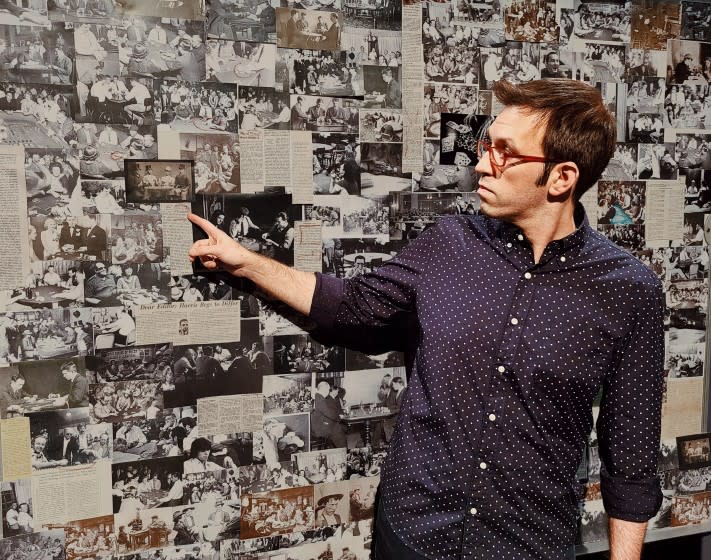Review: Helder Guimarães peers into 'The Future' for more Zoom magic. The view is fuzzy

- Oops!Something went wrong.Please try again later.
Illusionist and raconteur Helder Guimarães is back with another virtual show for the Geffen Playhouse’s Stayhouse series. The ingredients are familiar, though the spell isn’t quite the same.
In May, Guimarães gave us “The Present,” in which he related anecdotes about his Portuguese childhood with an austere grandfather while performing an array of card tricks that furthered his larger philosophical point about the truth not being always what it seemed. The show rightly took off, bringing enchantment to Zoom and transforming a tic-tac-toe board of viewers into a bona fide theater audience.
“The Future,” which opened Friday just in time for the holidays, feels somewhat premature. The production, under the direction of film producer Frank Marshall (who staged “The Present” and Guimarães’ pre-pandemic show at the Geffen, “Invisible Tango”) provides a neat showcase for the contemplative magician.
But the balance between storytelling and card tricks seems off. The yarn Guimarães tells about encountering one of his idols, a storied cardsharp who could effortlessly pull off any sleight of hand necessary to tilt a high-stakes game in his favor, gets lost in the shuffle of the show's activities.
Kevin, an Englishman living in Marseille, agreed to meet with the young Helder, who hoped to learn a few secrets of the trade from a master with a raffish reputation. Their meetings, first at the only British pub in town and later at a private poker game, are rich in atmosphere. But the character-drawing is fuzzy, and Guimarães' tentative delivery fails to realize the material's narrative potential.
One of the issues is that the audience has expanded from “The Present,” which was initially capped at 25 households. "The Future" has a cap of 125, draining the work of intimacy and making the audience participation component unwieldy.
For “The Present,” a mystery box was sent to us. For "The Future,” it’s a secret canister. The packaging, however, isn’t especially significant. The objects inside could have been shipped in a banal envelope.
Reluctant to give too much away, I will merely report that I'm a much better watcher of card tricks than a practitioner of them. Guimarães is flawless in his execution, but when he calls on the audience to play along at home, not every drama critic can keep up.
I knew I was in trouble when, in trying to open my sealed deck, I spilled the cards all over the floor. We were supposed to remove two jokers, but I only found one in my jumbled batch until the other eventually appeared, messing up a carefully arranged illusion that other audience members managed to pull off with aplomb.
I’ll happily take my seat in the back of the magician’s class. Shuffling has never been a favorite sport of mine. I find that even Guimarães’ most astonishing legerdemain — his ability to conjure a full house on command or convey a private telephone number from a seemingly random set of numerical possibilities — pales in comparison to his philosophical musings.
This time around, personal morality is the topic. In particular, the way our small decisions can have a large-scale impact that can be glimpsed only in retrospect.
Although there are some obvious analogies with the COVID-19 pandemic (the issue of wearing masks, for instance), Guimarães steers the discussion away from anything too topical. He's more intrigued by the conditions under which we're likely to lie and cheat. A couple of survey questions suggested that the opening night audience wasn’t any more upstanding than an inveterate cardsharp.
Could “The Future” be exposing something unflattering about the American character in 2020? That would be like unveiling the elephant in the room. Guimarães doesn’t press any points. Instead, he operates like one of those cappuccino makers he admires who draw figures in the foam.
The arty barista is a metaphor he returns to, but like the show as a whole it has some trouble coming into focus. Yet the tantalizing mind behind the magic leaves the impression that there’s more to "The Future” than meets the eye.
This story originally appeared in Los Angeles Times.

